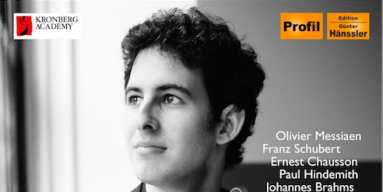Israeli violinist Itamar Zorman, winner of the 2011 Tchaikovsky International Violin Competition, has been furthering his stellar young career with new recordings, prestigious bookings, and recognition, having received a 2014 Borletti-Buitoni Trust Award and a 2013 Avery Fisher Career Grant. As he prepares for his "Distinctive Debut" concert at Carnegie Hall's Weill Recital Hall on November 5, he took some time to speak with us about his background and career.
Classicalite: You began studying the violin at age six. Why the violin?
Itamar Zorman: I chose the violin mainly because I was drawn to its sound from the beginning. Another reason was that my parents play many instruments among the two of them, but none of them plays the violin, so in playing it they couldn't really tell me what to do.
CL: In what ways was your family a family of musicians?
IZ: Both my parents are musicians: My mother is a pianist who also performs lecture recitals in a unique format (there are some examples on YouTube, like this one), and my father is a composer. My two little sisters play as well: One plays guitar and sings, and the other plays piano.
CL: Could you tell us a little about how you've developed as a musician in the context of the teachers you've studied with over the years?
There are quite a few people from whom I learned a lot during the years, some of whom weren't even my "regular" teachers, but teachers at masterclasses or summer festivals, and others were musicians I played chamber music with. However, two main influences were Nava Milo, with whom I studied in Israel, who managed to free me physically when playing the violin, and Sylvia Rosenberg, with whom I studied at Juilliard and at Manhattan School of Music, who taught me how to practice as well as some fundamental musical concepts, which now help me in any piece of music I encounter. These are of course serious generalizations, I learned many other things from both of them as well.
CL: You're presenting a varied and challenging program at your "Distinctive Debuts" concert at Carnegie Hall's Weill Recital Hall on November 5--Bach, Schnittke, Hindemith and Brahms. Do you have to shift mental gears to perform works by these very different composers?
Yes, very much so. I believe that different composers and styles require the performer to step on stage with a different energy, and focus on various aspects of the music. It is indeed difficult to make the quick change, so I will need to practice it in running through the program, and to remember to take the required time between pieces to change my focus.
CLICK HERE TO CONTINUE READING











